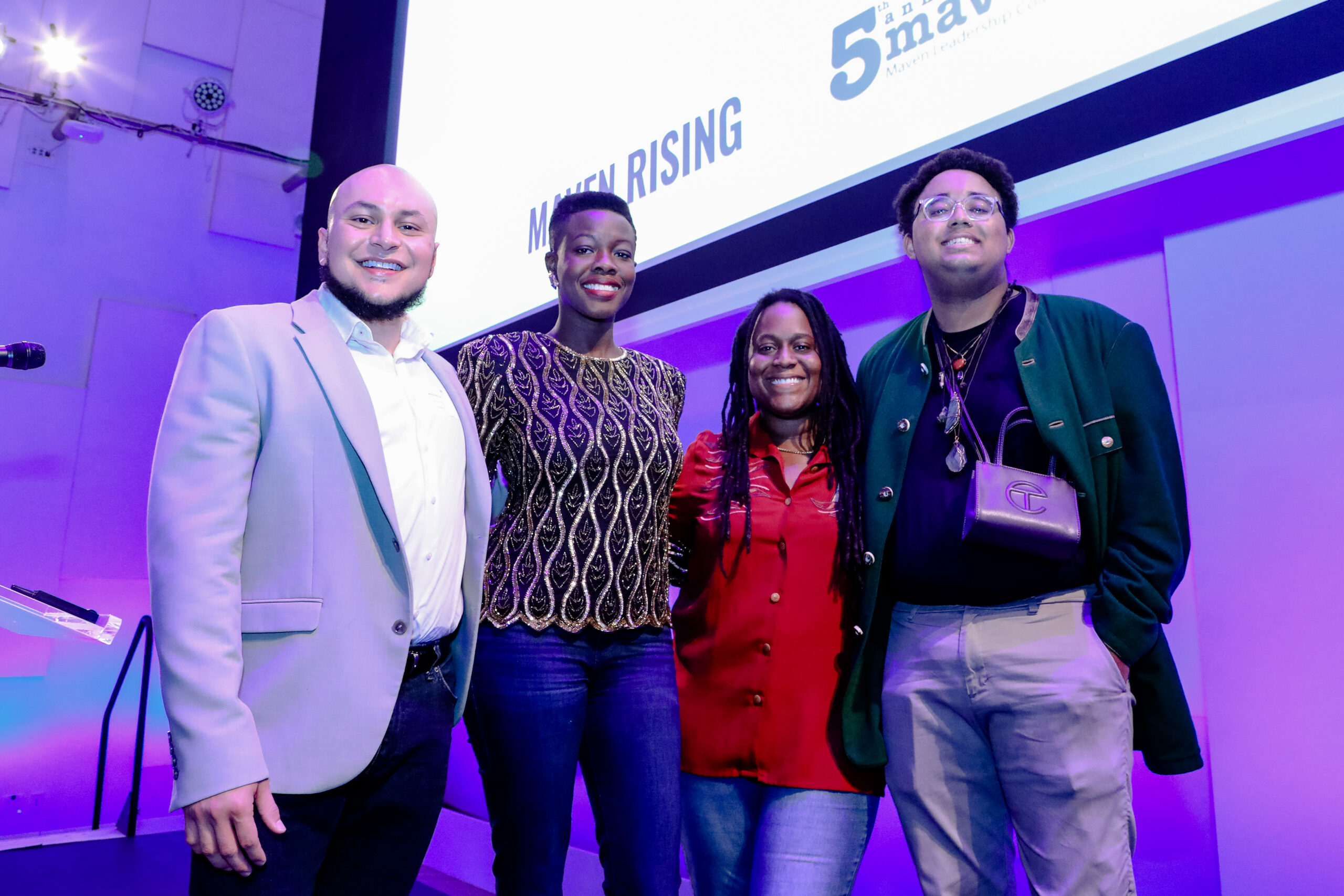
What Compels a Leader to Action?
“Today I want to bear witness to community love in the tradition of the Black church,” said Nadege Green (She | Her), Maven and founder of Black Miami Dade, during the opening of her Power of One speech at Maven Rising. “When you witness, when you share your testimony, it is both an offering and an invitation. I don’t even go to church but my story may not be your story but it doesn’t mean you can’t take something from it.”
Green joined a group of two other Mavens, Anthony Sis (They | Them) and Adam Ropizar (He | They), who each shared how they grew into their individual power in the face of injustice and leveraged it to support equitable collective action and healing. Though each story was as unique as the storyteller themself, the poignant yet humorous accounts reminded the audience that each person is capable of harnessing their strength, taking time to heal and investing that care into a community after them.
The Power of One Session dug to the root of this by asking what compels someone who encounters an injustice, to decide not only to heal, but to also work to ensure that others do not suffer the same harm? Then, they took it a step further by asking, how can we allow these experiences to inform the way organizations show up for the people they serve?
Anthony Sis, a Maven and management consultant with Accenture, shared a story about familial loss. Sis was at the peak of his career, having started his own consulting business called Cultura Shift with the support of Maven. But, Sis had never learned how to rest. In the midst of this peak, Sis’s father was diagnosed with liver cancer, his grandmother got COVID-19, and by December 2020 his entire family was hospitalized with the virus. His grandmother and father passed away and Sis was thrust into a well of mourning and grief.
“For some reason, I felt like I knew what to expect when it came to the grieving and mourning of these two anchors in my life,” Sis said. “But I was so wrong. I remember looking at one of my close friends in her eyes and my father’s service, because she too, had just lost her mother a few years prior. It was a gaze that needed no explanation. I looked at her. She looked at me. I asked her, this feeling never goes away, does it? She said no.”
Realizing that grief was not a singular moment, Sis changed his entire approach to his work. He began trying to craft a solution flexible enough to allow him to experience his emotions–to give himself permission to feel.
“I see how others in my community can be so hard on ourselves, to be the best, to do the best to be better, but emotions are seen as something that needs fixing,” Sis said. “Emotions are seen as distracting from the real issue, as opposed to being seen as the weeds needed to be plucked out in order to grow a healthy, nurturing garden that we all deserve. Nobody taught me any of this. I learned this through acts of love, acts of empathy, that those around me showcase at a time when I needed it the most.”
Sis began to slow down, to go to therapy, to ground himself in his emotions, and most importantly–rest–so he could refill his own tank before giving to others.
Adam Ropizar, Maven and executive director of Evolve Campus, shared a story deeply rooted in trauma at the tender age of 15. Ropizar was a high school student still in the closet, but when his openly gay crush invited him to skip an after school club meeting and escape to a bathroom stall, everything changed. They kissed, touched, and quickly ascended to cloud nine in only the way young lovers can. Until Ropizar’s bliss was shattered by betrayal.
“Spiritual in the sense that we’re all human and can’t control everything that happens,” said Ropizar. “Spiritual in the sense that as humans, we all have one moment that is at the core of who we are.”
Someone had snuck into the bathroom stall and recorded what Ropizar had assumed was an innocent and intimate experience. The person then airdropped the video to other classmates and posted it on Twitter where it went viral. Ropizar was suspended and faced death threats, harassment, and jokes even from the faculty. At such a young age, Ropizar was robbed of his humanity and forced to overcome an unthinkable betrayal.
“Fifteen and wondering if I was about to become a statistic,” Ropizar said. “But also fifteen and deciding I’m gonna say fuck it. Fifteen and deciding that I refuse to allow somebody to take away my agency, my power and my future. What I’ve learned is that when we feel the smallest, when the entire world is looking down at you, almost daring you to try. That’s when you have the highest potential to fly.”
Ropizar has carried the memory and the lessons with him always remembering how to move forward.
Nadege Green, Maven and founder of Black Miami-Dade took time to remember and honor three Black women who poured into her from a young age and help cultivate her love of storytelling.
“Despite the carefully built and placed barriers for children like myself, some of the most beautiful moments of my childhood and young adulthood were rooted in love that came from outside of my home, community love,” Green said.
Green’s childhood librarian, Shanique Jenkins, doted on her, giving her first pick of the books being phased out of the library every summer. Jenkins’ care was not rooted in selfish personal gain, but rather a pure desire in supporting Green’s interests. In highschool, Green’s teacher, Michelle Murray affirmed her Blackness and her brilliance.
“She would laugh at the pageantry of folks who thought they could predict who and what we would become based on our underfunded and neglected zip codes,” Green said. “She would tell us they think they know they have no idea.”
As a young journalist at the Miami Herald, Green sat next to Bea Hines, the first ever Black reporter hired by the Miami Herald. Hines would share her lunch with Green and give her “a masterclass on storytelling.”
“I am because of women like Sheniqua Jenkins, Michelle Murray, and Bea Hines,” Green said. “I am because of community love that propelled me even when I thought I couldn’t reach.”
Green closed her moving speech by calling on the audience to remember and excavate the memories of community love they have experienced and “be that love for someone else.”
See below for the Power of One Speech’s

